It’s a relatively cool day for a tropical climate. A lovely, comfortable 78 degrees. But in Madaline’s small, cinder block home, the mood of its inhabitants in no way reflects the gloriousness of the weather. Schools have been closed since September, so her 6 children help her make trips back and forth to the river to get fresh water. They play as much as they can, but it’s hard to find the energy. They haven’t eaten in 2 days. They’re holding onto hope and their love for one another in this desperate moment, when their best friend James comes through the door carrying bags of groceries. The entire family erupts into tears of relief. This is the reality for most families in Haiti right now. But for whatever reason, no one is talking about it. If you google “how to help Haiti,” most articles are from 2011 after the earthquake, and none are from recent months. This despite the fact though this turmoil is new, and it’s leaving families to starve.
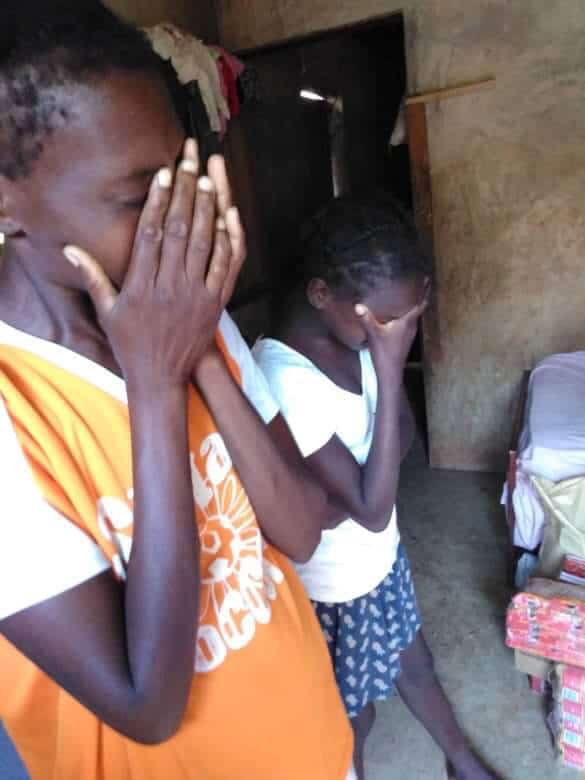

This site contains affiliate links, meaning that we earn a small commission for purchases made through our site. We only recommend products we personally use, love, or have thoroughly vetted.
- A Recent History of Hatian Relief from an American Perspective
- What is Going on in Haiti in 2019: Protests and their Aftermath
- What does this mean for Haiti in the current moment, and why is no one talking about it?
- What Can We Do to Help Haiti and Its People?
- A Love for Haiti: Shelby’s Story
- Madaline and Motherhood
- The Puppy
- They Were Happy
- Life, Guilt, and a Shifting Worldview
- Doing What You Can, and Doing it NOW
- Imagine This Situation
- We Have a Humanitarian Responsibility
- How You Can Help Haiti
A Recent History of Hatian Relief from an American Perspective
When we think about Haiti, our minds probably return to the devastating 7.0 magnitude earthquake that rocked the tiny nation in 2010. The quake that sent Haiti’s already tenuous economy and infrastructure into a massive tailspin.
The images from that time in Haiti’s history still haunt our collective memory:
- babies being pulled from rubble
- children starving in the aftermath
- devastation of land, buildings, and lives
What most average Americans don’t know is that the country is still experiencing aftershocks of this earthquake in the form of a corrupt government that has failed to rectify the myriad challenges that the country still faces.
There is a mass fuel and food shortage. Lack of clean drinking water. Land degradation (land that won’t support the dense population of the country). The list goes on and on.
When Shelby–a NICU nurse who has been interviewed by Undefining Motherhood on working mom guilt–wanted to return to Haiti after a mission trip there last year, she began to realize just how bad things had gotten.
Hoping to visit her friends, Shelby learned of serious travel warnings against going back to Haiti, which led her to begin asking hard questions to the dear friends she had made. Her main contact was James, but she could not help but worry about Madaline and her children, in addition to James’s own family.
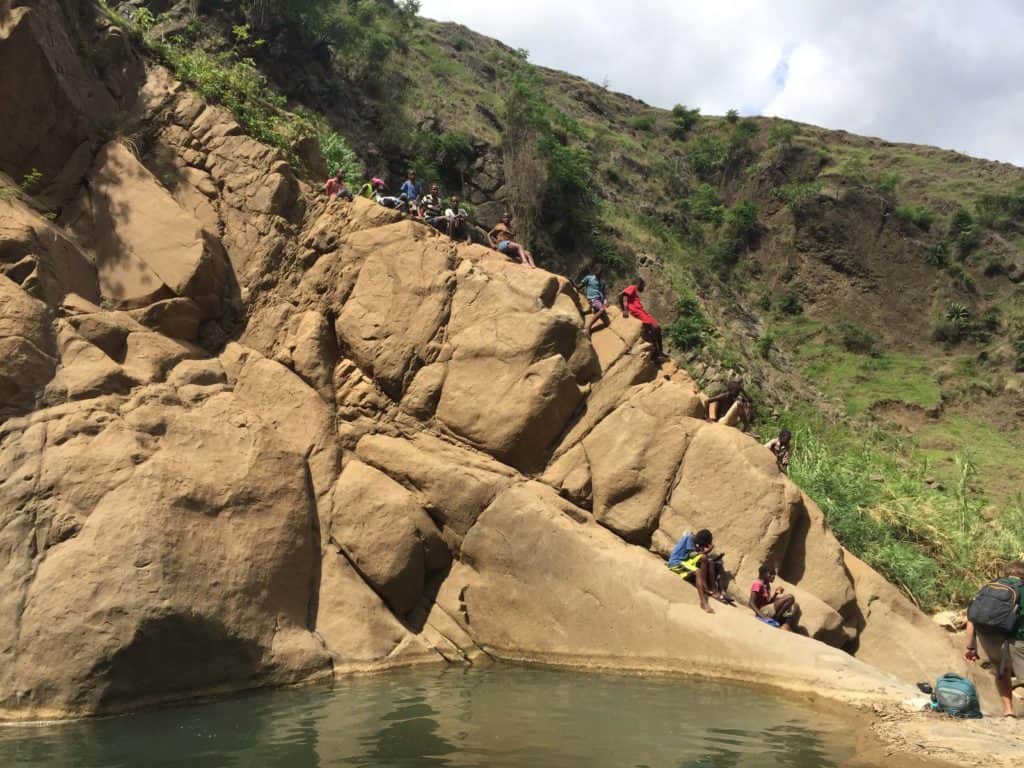
Madaline, like most Haitian mothers, is doing her best to make do and help her family survive. James, a (currently unemployed) Haitian resort worker, has turned into what we’ve dubbed the Haitian Santa Claus because he is so concerned with delivering food to his neighbors. Their story is of hunger, fear, and immediate and pressing need.
And we can help them. We can help Haiti and its people.
What is Going on in Haiti in 2019: Protests and their Aftermath
Many Haitians are fed up with President Jovenel Moïse, who was democratically elected amid major controversy in 2017. Last summer, he was accused of reaping millions of dollars in profits from funds meant to help the Haitian people before he became president, when he was still a cabinet minister and business owner. He denies the allegations, but the money is nowhere to be found, and it certainly hasn’t been used to help his country. These grave accusations, along with other economic problems, have made Moïse an extremely controversial president, even for a country with a fraught political history.
Protests have flared up three times over the past year, but recent protests reached new heights following a massive fuel shortage in September.
According to the Washington Post, this string of protests is unique because not only is it the longest running protest Moïse has faced, but it is also the most broad. No longer is the protest the manifestation of the anger and frustration of the poor. This time, the intellectual elite and the upper classes have joined, as well.
What does this mean for Haiti in the current moment, and why is no one talking about it?
Besides a New York Times article and the Washington Post article we mentioned, you’d be hard pressed to find media outlets talking about the political unrest currently happening in Haiti. And even those articles aren’t from recent weeks.
The U.S. and Canada have issued very strong travel advisories for Haiti, and its people are starving in the wake of the violence of the sprawling war-like protests. Yet we still have very little access to information about what is happening there.
The information in this article is coming mostly from James and Madaline, whose stories we will tell. Some of it also comes from Sami, one of the founders of Upstream International, an on-the-ground organization in Port-au-Prince that has shifted its usual focus on job creation and education to meet the most immediate needs–feeding starving families.
Here’s some of what we do know:
- Hospitals have little to no access to the basics, including oxygen and basic medicines
- People are out of work and out of food
- Roads are blocked off, making it extremely difficult to get supplies to rural areas in Haiti, and causing extreme price inflation in those remote areas
- The protests, while potentially necessary for the political future of the country, have shut down an already weak and ravaged economy and infrastructure
- It’s likely to get worse before it gets better
Monday Could Drastically Worsen the Situation: Battle of Vertieres Day 2019
The biggest protests yet will likely be this Monday, November 18th, a day when the country of Haiti usually celebrates its independence from France. The Battle of Vertieres (November 18, 1803) was a particularly important one for Haitians, as Haitian forces were mostly made up of liberated slaves.
For many present-day Haitians, this holiday represents the ability to gain the freedom they currently seek–freedom from fear, starvation, poverty, and lack of basic infrastructure.
In 1803, the Haitian people overthrew Napoleon’s forces and the country that had enslaved them and corrupted their land. Hatian protesters in 2019 are protesting with similar hopes. This time, they want to overthrow the government and forces that hold them in poverty and desolation.
Protests are expected to reach a fever pitch, with access to more remote parts of the country blocked by war-like protests. Food, fuel, and generators will become even more scarce as roads are blocked and safety is nonexistent.
What Can We Do to Help Haiti and Its People?
We can use this platform to speak this issue into our world, our realm.
We want to spread the word before Monday, Battle of Vertieres Day, in order to get money and supplies to people and groups we are currently in contact with. Every organization we recommend, which is sadly few, has been thoroughly vetted. We’ve been in direct contact, understand their efforts, and believe they’re truly doing work to help the desperate Haitian people struggling through starvation and a level of poverty most of us can’t even imagine.
To help us try to imagine, we’d like to tell a story.
A Love for Haiti: Shelby’s Story
When I traveled to Haiti with my daughter, James was the first person to greet our group once we got through the airport. He reached for my luggage, and I didn’t know how to respond. We had been through training about how to interact with Haitians in order to (1) stay safe and (2) be respectful of their culture and country. In this training, we’d been told not to let anyone touch our luggage.
But James’s deep brown eyes met mine, and a smile bigger than I even knew possible spread across his dark face, sharply contrasting his white teeth.
My heart didn’t fit what I’d been trained to believe. He seemed like a man I could trust.
“You’re with me! You’re with me!” James said as he patted his chest. I looked back at my pastor for confirmation, and he nodded. I turned back to James’ wide grin as he said “It’s Okaaay!!” in a thick Haitian Creole accent.
So I gave him my luggage and clung tightly to my nine-year-old daughter, still not entirely certain what I had gotten us into. But my naivete and fear would soon vanish completely because of James.
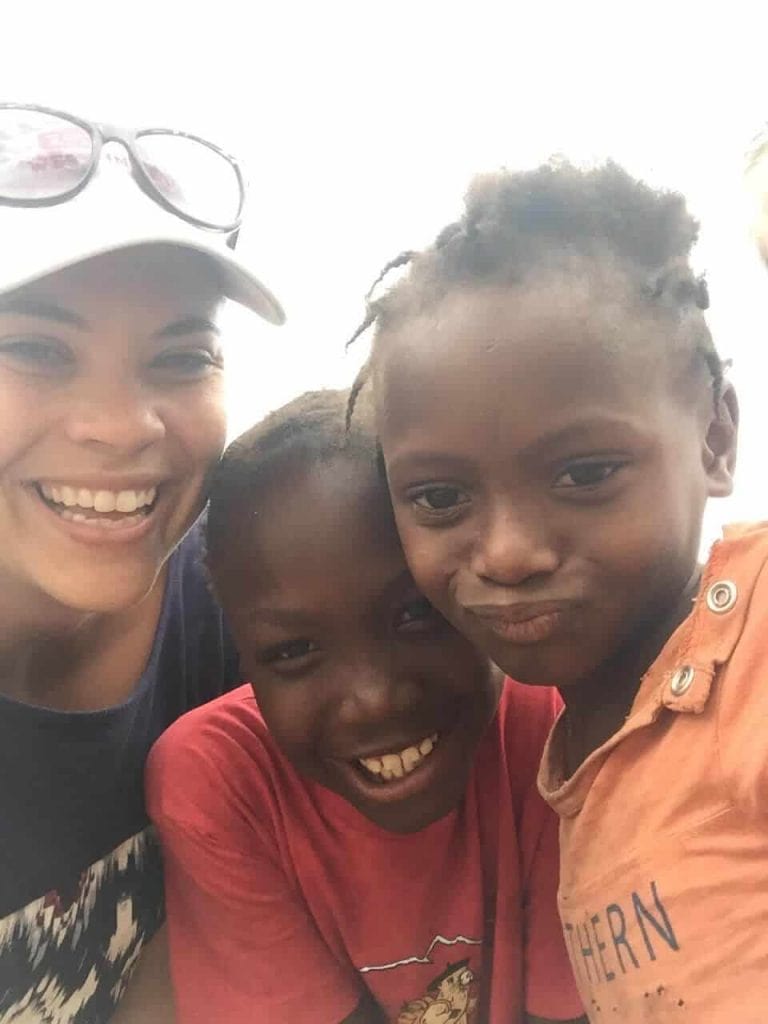
How We Got to Haiti
In the summer of 2018, my oldest daughter wanted to join our church on a trip to Haiti, so I took a week off work so we could go together. It would be a very new experience for us both.
Of course we’ve all seen the pictures and read the heartbreaking stories, but to be immersed in the culture and get to know the wonderful Haitian people rocked my world view completely. To experience that with my daughter was priceless.
We traveled through an organization which operates a “resort” for “missionaries.” It’s not your typical mission. Instead, it’s a time to visit the country, support its citizens financially by spending your money, and thus providing jobs in areas with otherwise few employment opportunities. The “resort” was run by Haitians. Everything from the food we ate to the furniture we sat on was made by Haitians–the goal was to provide as many job opportunities as possible.
The resort was a radical new concept in ministry aimed at inspiring a deep love for the country and her people while providing desperately needed employment.
The idea was that Haitians don’t need us to come build them a house, paint a fence, or give them hand outs. The people need and want jobs to be self sustainable.
They don’t need our stuff; they need us to buy their stuff.
Haitians are incredibly hard working people, but they rely heavily on mission groups for work because the country itself has no tourism industry–the primary income of most island nations–and has been plagued by governmental corruption for far too long.
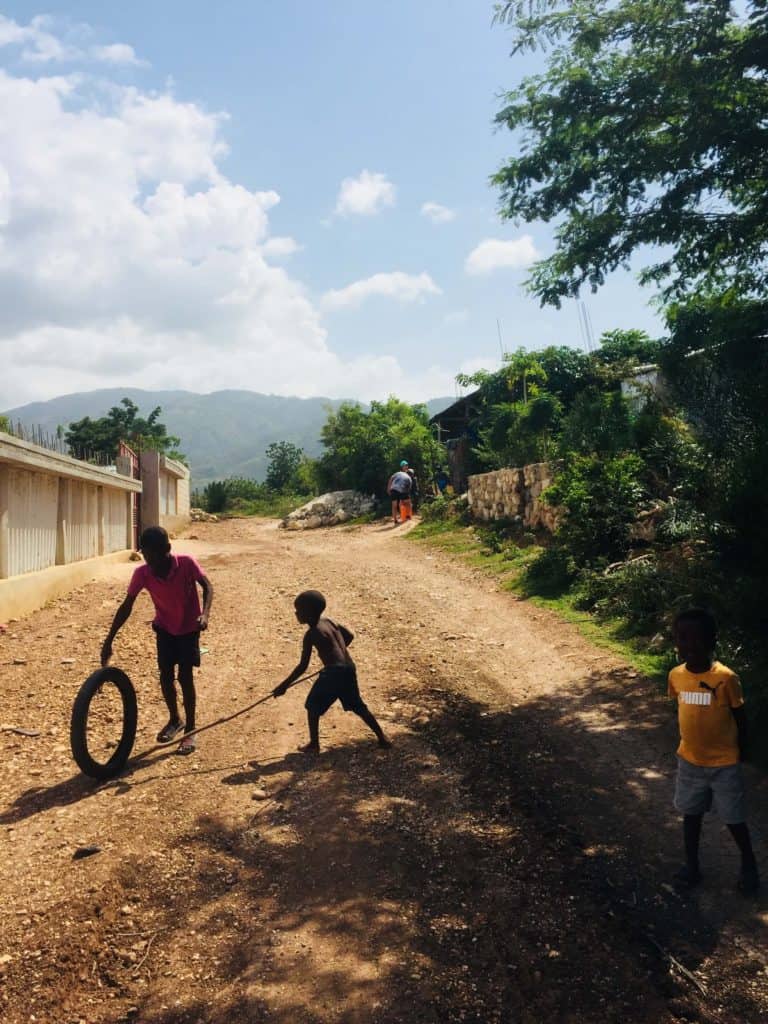
Getting to Know James, AKA “Haitian Santa”
When we first arrived in Haiti, James squeezed in next to me in the van and made small talk. He engaged me in conversation, and I felt a wave of peace wash over me.
Throughout the trip James was our “guide.”
He held Haitian Creole lessons in the morning, and he took us into the city to explore in the afternoons.
James and I had long conversations in which he was an open book, answering my questions about healthcare in Haiti. I told him about my life as a NICU nurse, and he asked what we do with babies the mother abandons at the hospital.
Confused, I explained to him that abandonment does not usually happen because mothers are prosecuted for this in America. The concept of an American mother’s options for an unwanted child blew his mind.
You see, Haiti has an outstanding orphan crisis. Parents who simply cannot afford their children leave them at the hospital after delivery. Or they keep them, but only for as long as they can provide for them.
Lucky children find their way to an orphanage. Some are destined for the streets, alone, where a fate that can be considered worse than death awaits them.
James Taught Me About “Restavecks”
In the streets orphans are at risk of being taken in by families as “restaveks.”
A restaveck is defined as “an abused child in a family that is not his or her biological family.” (according to Nadine Augustin Paul, a Hatian child advocate). “This child was given to a host family in the hope of a better life in exchange for doing chores. However, the child is vunerable, and lives in a modern kind of slavery.”
One in fifteen children in Haiti lives as a restavek, and sixty percent of these children are girls.
James’s Childhood and Rescue from the Street
As a child, James was taken to an orphanage sponsored by the same organization that ran the resort where we were staying. His mother took him there at age of 11 because she could no longer provide for him.
He confided in me that he now understands what a blessing this was, but at the time he hated his father for making his mother send him away.
James spoke fondly of his own wife and son. He was proud that he was able to work and provide for his family.
He bonded with my daughter, and it was very apparent that he was a good father. On our last night in Haiti, he brought his wife and son to the resort to meet us.
In our short week together, we established an amazing friendship.
Madaline and Motherhood
On our evening walks outside of the resort compound, we visited the locals. Part of what we were there to do was to foster relationships and understand the needs of Haiti’s people.
I don’t think I had any concept of what this would look like or the lasting impact it would have on me as a mother.
James walked with us up a long, rocky hill. Another guide began whistling softly at first, and his whistling became louder as we walked.
Hearing his whistle, a dirty child emerged from the woods with a squeal and began running excitedly with open arms.
The sound of his excitement attracted other children, who realized what was happening and reacted with the same enthusiasm. Suddenly, we were surrounded with hugging, laughter, and huge smiles in joyous reunion.
The skinny children were filthy, wearing tattered clothes at least two sizes too small. But man, they were HAPPY. These were Madaline’s six children.
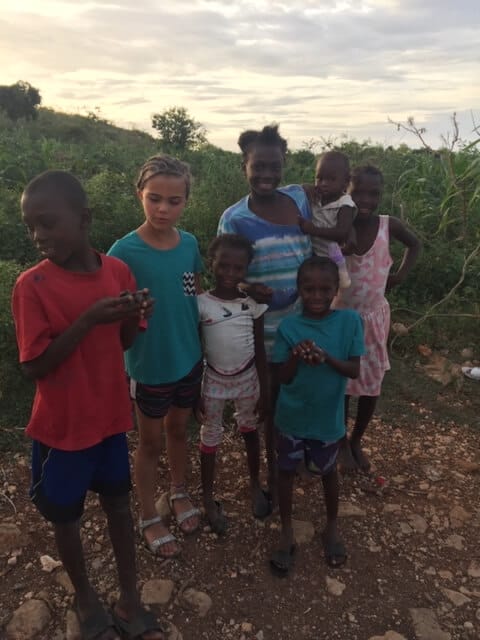
When the children took me to Madaline, she invited me into their home. Under a covered outdoor area was a small fire pit where she cooked. The youngest, not quite 2, tottered dangerously close. Inside the first room were two twin beds with torn dirty blankets, nothing else. The children had scribbled on the cement walls.
The second room was a small table scattered with a little bit of cookware, and bags of shelf stable foods.
She wouldn’t let us see the “bathroom,” metal sheets leaned together to cover what I assume was a toilet of sorts. She held her nose, shook her head no, and laughed.
Madaline welcomed me into her humble home with open arms. Later, James told me that he had never seen her open up to anyone like that or show them her home.
James was close by to translate, but I didn’t need him.
Madaline wrapped her long slender arms around my neck with the baby still attached to her breast and nearly hugged the life out of me.
Soon, my daughter was at my side. I showed Madaline my daughter and said, “You, Mama. Me, Mama!” She laughed, and instantly we were connected in the universal realm of motherhood.
Our hearts understood each other in an unexplainable way that transcended language and geography.
The Water Challenge: Learning About the Hard Work Madaline Does Each Day
That evening I wrestled with my thoughts. How do I go back to this resort, eat a hot fresh meal, take a shower, and sleep in a safe clean bed with them living with so little right outside my door???
I woke up with my eyes swollen from hot tears, and an emotional hangover.
The next day, we were scheduled to participate in the “water challenge.” This involved serving the people living near the resort by gathering their empty water jugs and making one of their many trips down to the river bed to fill the jugs. Then, hauling them back up the treacherous hill to their owners.
Of course I got Madaline’s jugs, eager to serve the woman with whom I felt such a profound bond.
Without running water, she had to make this trip at least four times a day to supply her and her six children with the water they needed to make it through the day.
The physical struggle was beyond what I could have ever expected.
The children came with us and laughed at us while jumping barefoot up the hill like agile mountain goats. I sweated profusely, moaned in pain, and took several breaks.
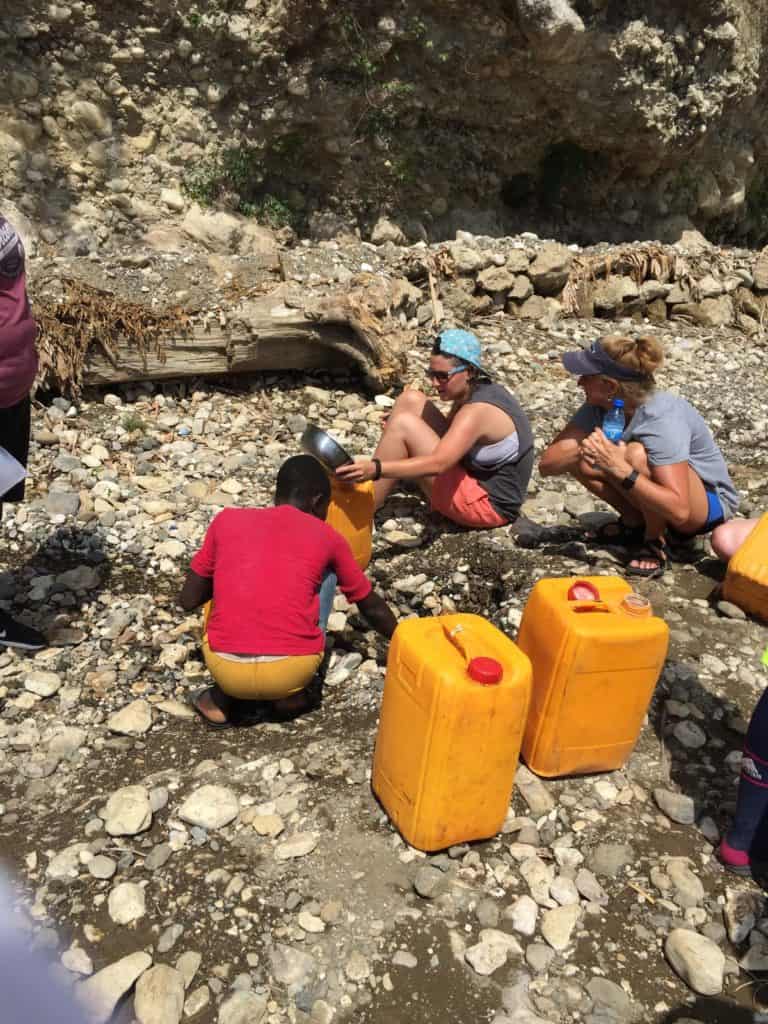
It took me at least three times as long as it should have to get the water to Madaline’s house.
When I got to Madaline with the jug, she had changed her clothes, and her baby’s, to be “presentable” for us. I wished I could’ve changed the feeling that suggested she needed to “present” anything. We weren’t there to see what we want her life to look like. We were there to see her life as it was. And what it was radiated compassion, care, and incredible grit.
I wanted James close by to translate exactly what I wanted to say to her, which was–once I was able to catch my breath–“I respect you!”
She laughed, pulled me in tight, and we both wept.
Our pastor asked the group that night what we had each left down in the riverbed. My response was simply “ungratefulness.”
The Puppy
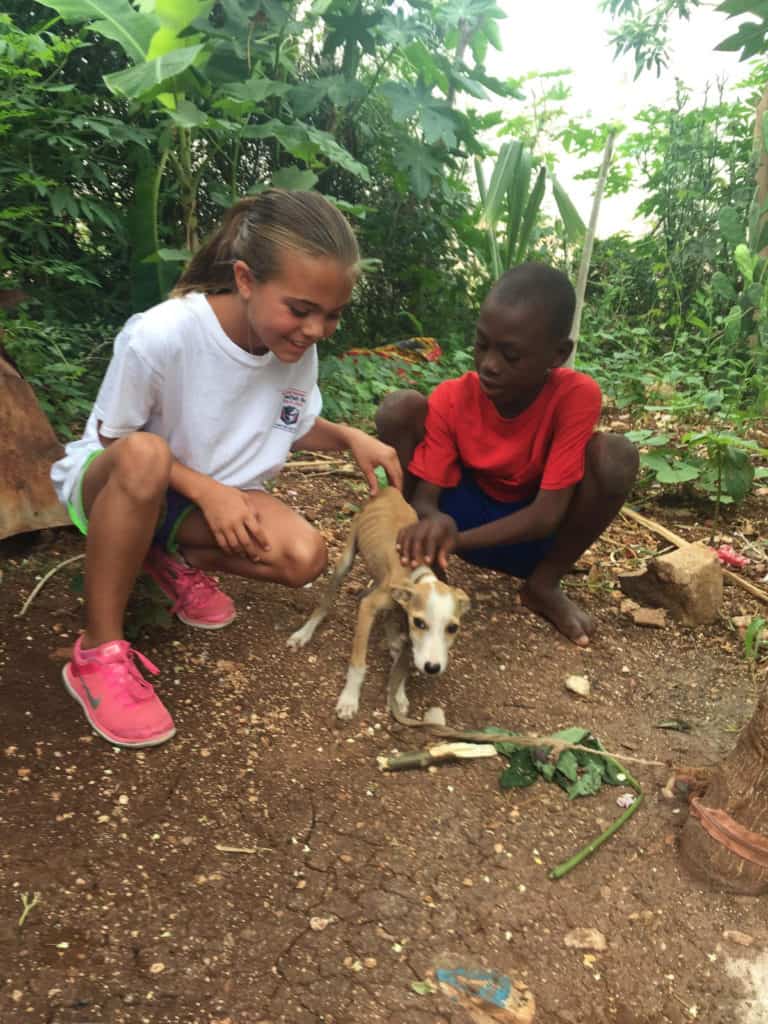
While Madaline and I were talking, one of her children took my daughter behind their home to see his puppy.
The emaciated, mangy creature was loosely tied to a rock, and my daughter gasped when she saw it.
She petted him for a minute at her friend’s insistence before taking my phone to show her a picture of our well-fed family dog. They laughed together and skipped off to braid each other’s hair.
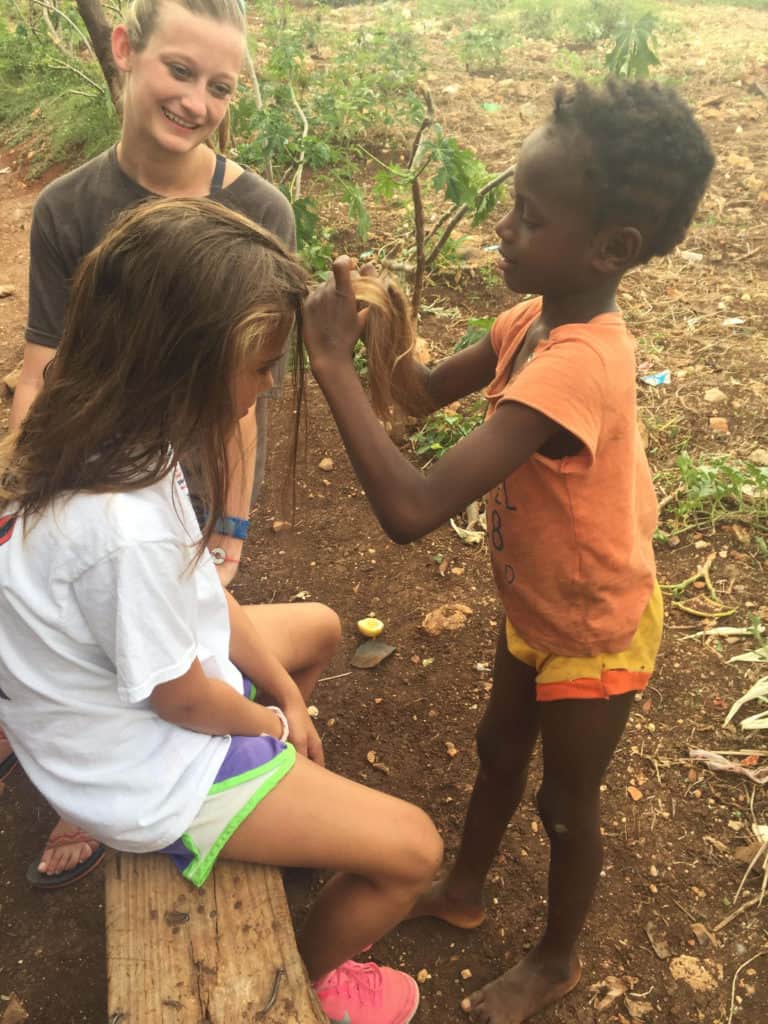
Then, they watched the boys play soccer with the ball she had insisted on bringing in her suitcase. We had learned that the children often play with water bottles when there is no ball to kick, so my daughter insisted on bringing a ball. To her, this seemed like something all children should have.
They Were Happy
My daughter and I both cried all the way home from Haiti.
She cried over the stray, bony limping dogs in the street.
I cried over the naked babies bathing in the river.
And, I’ll be honest, I was not happy with her being more upset over the animals than the people.
When I called her out on it, she said, “Mama, the people are happy.” She was right.
Life, Guilt, and a Shifting Worldview
I returned to Alabama on my thirty-third birthday. To my big comfortable house with a refrigerator full of food and my beautiful, healthy children dressed in clean clothes that fit.
I felt deep pain and guilt for living comfortably while I knew my new friends in Haiti were not.
But “Mama, the people are happy” echoed in my mind.
I could close my eyes and put myself right back on the 2×4 wooden board fashioned into a church pew with rebar, surrounded by happy Haitians singing hymns and thanking God for their “many blessings.”
I hated myself for not being content with what I had. It was a very dark time.
So I threw myself back into work and motherhood–the daily grind. Haiti bubbled to my mind occasionally. I friended James on Facebook.
I saw the occasional mention of political unrest in Haiti, but “What’s new?” was my usual thought. That might’ve been your thought, too, before reading this story. I hope it’s not now.
I separated myself just enough to not feel the guilt but not enough to forget it.
Life went on, but I was eager to return for a week in the summer. Anger flooded through me when travel was banned and our trip was postponed. I honestly thought we were not trying hard enough.
So what if there are a few protestors in the street? We’ll wave to them on our way to James’s house, I thought.
There was talk about waiting to take the trip in the fall. But fall came and travel was still banned. Life went on.
James’ Plea
Until the day James messaged me. It was a grim message, nothing like I’d come to expect from this joyful, happy person:
“It is very dangerous outside,” He said. “Schools still close, no missionaries at the compound, I can’t work for many months. They protest a lot, block the road, shoot people, burn tires in the streets, alot of unrest everywhere. We don’t know what to do. We don’t have food, we have used what we had.”
My head spun.
Is this true?? James wouldn’t lie.
I dove into any and all articles I could find on the situation.
Why haven’t we heard how bad this is? The lack of media attention was unnerving.
Politics. Red tape. Corrupt government. I still don’t understand it completely.
But I know that my friends and their families are suffering because of situations beyond their control.
I want to fly to Haiti, swoop in and grab James, his wife, and son, as well as Madaline and the children and rescue them. But I feel completely and totally helpless.
The question, “What do I do??” resounds in my mind.
Okay, I thought. I can’t fly to Haiti. But I can do something.
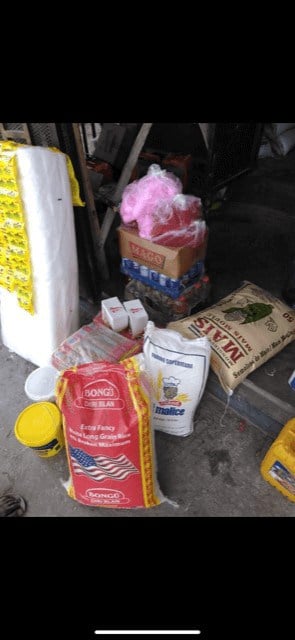
Doing What You Can, and Doing it NOW
They need food and they need it now.
So for the first time in my life, I wired money internationally. Not going to lie, that felt weird. And I continued to research.
That’s when I found the New York Times photograph of two babies in a dark makeshift Haitian NICU, lying in unkept cribs with bloody handprints on the wall.
The NYT article claimed the hospital was forced to choose who would receive medical attention due to limited resources as a result of the current crisis.
As a NICU nurse familiar with the luxuries of American NICU’s, the image haunted me, and I did not sleep.
Imagine This Situation
Imagine being a Haitian mother. No options, no choices, no way to care for your child because of things beyond your control. Stop, close your eyes for a minute, and just imagine this scenario. Imagine your child crying from hunger and having no food. Imagine your child needing medical attention at the moment of its birth and having none.
Take a minute. Imagine it.
We all know motherhood is hard.
But what if you were stripped of all the modern luxuries we enjoy? The bottle warmer, the warm clean bath water and baby soap, the clean linen and disposable diapers?
What if your biggest problem today was not trying to find the perfect matching hair bow on your child’s way out the door to receive a public education, but rather whether or not you had food for her?
What if your baby needed medical attention after birth and there was none?
We Have a Humanitarian Responsibility
It’s no secret Americans are entitled. I don’t claim to know the long term solution for Haiti, or if there even is one.
But I do know that I have a humanitarian responsibility to tell this story, and to ask for your help as well.
Poverty, hunger, and human slavery are simply unacceptable in 2019.
I may be only a drop in the bucket, but if you join me, together we can fill the bucket.
James is already busy distributing food he bought with the money I collected for him and Madaline and her family. He’s been around his village finding out what people need. He buys what he’s able to find at the store with the money I send, and he distributes it to all the families he can.
He uses the fuel that he has to deliver food and supplies to families he knows have none. I’m so proud of James, and my heart swells with pride to know he chose me as his friend.
James and I have been in close contact because he has access to a generator to charge his phone, and when the generator is running, he has access to the internet. With Monday’s protests impending, I do not know how much longer that will continue.
He sends me receipts for everything he buys, even though I didn’t ask for them. He is incredibly careful to let me know how the money has been spent and how the supplies have been distributed. I trust him with my life, my daughter’s life, and with the lives of Madaline and her babies.
How You Can Help Haiti
This is the story of Madaline, he children, and James and his family. We cannot leave them stranded alone in crisis.
But theirs is also the story of many other Haitian people. Good-hearted, hard working people who want nothing more than to be able to live in a safe environment where they can work and take care of their families.
If you want to help other Haitians in dire need of food, we recommend Upstream International, where every dollar donated will go directly to feeding Haitian families until this crisis resolves.
If you’re interested in helping provide medical care, Shelby and her medical connections recommend Mission of Hope International. You can also donate directly to Haiti through Doctors without Borders (this link takes you directly to the Haitian donation page).
We have other organizations who have been recommended, and are in the process of vetting their current efforts. We will update this article as we receive more information.
We cannot leave Haiti in the dark. Madaline’s children need us. Every Haitian family needs us. Help us help them.
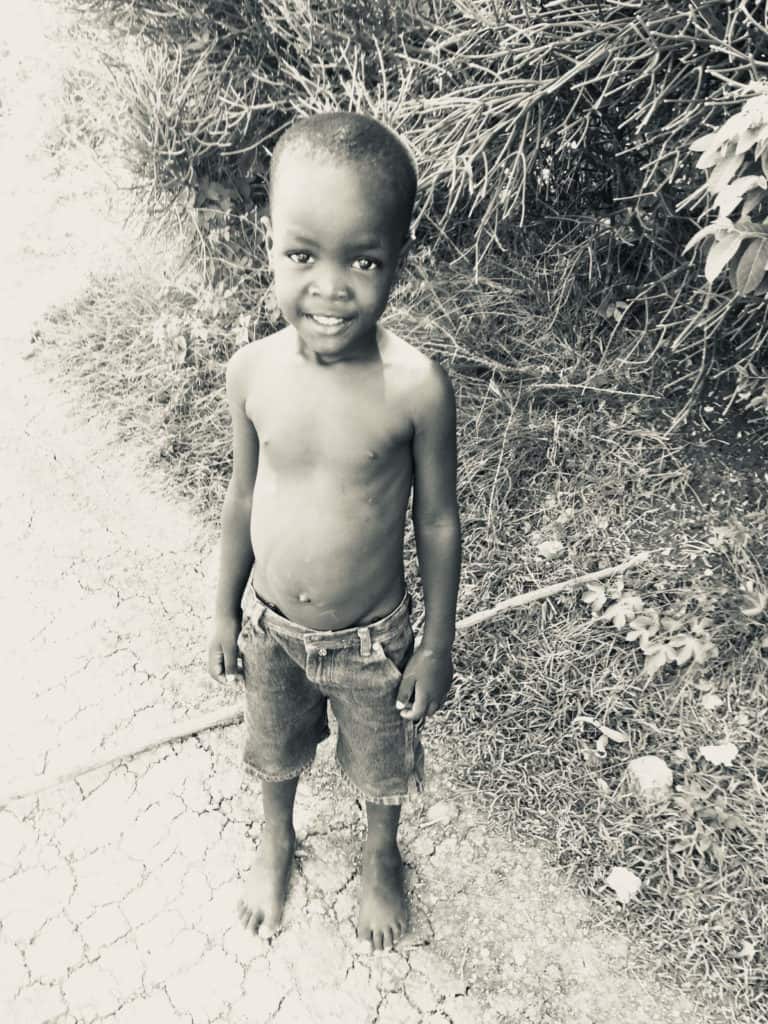
Due to the dangerous situation in Haiti, particularly for those receiving money, we have changed James and Madaline’s names and have hidden their faces to protect their safety. We have omitted the name of the resort Shelby visited and any references to location for the same reason.
We have taken every possible step to be as truthful and transparent with you, our readers, while also protecting the people we aim to help. Reach out to us if you have any questions, but please do not post anything in the comments that could infringe on these people’s privacy.
Also note that the organizations we recommend will not disclose the amount of money they receive for the same safety reasons. Please do not view this as a lack of transparency on their ends. We are all taking necessary precautions.









Oh, Shelby! The crisis is heartbreaking. 1 in 15 kids lives as a domestic slave because of infant abandonment? That is something I never knew about. I saw the NYT articles, but your first hand account is eye opening.